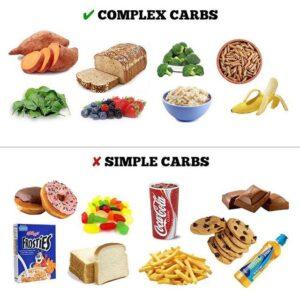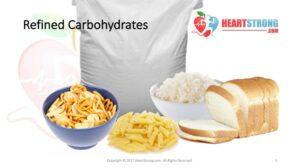Carbohydrates – are organic compounds that compose the sugars, starches, and fiber content in our diet. Your body converts 100% of carbohydrates into glucose and when broken down, the waste products are water (H2O) and carbon dioxide (CO2).
Glucose is the refined fuel for metabolism and is the quickest form of energy available. Glucose is transported from the blood into the cells by insulin. Excess glucose is stored in the liver and muscles as glycogen, which can be rapidly converted back into glucose for quick energy. When all liver and muscle stores have been filled, excess carbohydrates are converted into fat and stored in adipose tissues for future use.
 Complex Carbohydrates, are the healthy or slow acting carbohydrates. These compounds are larger than simple carbohydrates and must be reduced into smaller molecules before they can be absorbed. Because they are digested slower than simple carbs, they are less likely to be converted into fat. Because they remain in the digestive system longer, they tend to satisfy hunger better than simple carbohydrates. Complex carbs include whole grain products, beans, root vegetables, starches and fibers.
Complex Carbohydrates, are the healthy or slow acting carbohydrates. These compounds are larger than simple carbohydrates and must be reduced into smaller molecules before they can be absorbed. Because they are digested slower than simple carbs, they are less likely to be converted into fat. Because they remain in the digestive system longer, they tend to satisfy hunger better than simple carbohydrates. Complex carbs include whole grain products, beans, root vegetables, starches and fibers.
Simple Carbohydrates, are the sugars or fast-acting carbs. These compounds are small and require very little processing to be absorbed. Because these get absorbed so rapidly, they do not remain in the digestive system long enough to satisfy hunger. The fast-acting nature of these carbs allow muscle and liver tissue to get saturated rapidly and the excess gets converted into fat quickly. Simple carbs include fruits (fructose), dairy products (lactose), honey, syrups, and table sugar (sucrose).
 Processed or Refined Carbohydrates, are carbs that have had fiber, bran, vitamins and minerals striped away, leaving only the concentrated sugars. These are known as “empty calories” because they have little nutritional content but contain excessive caloric value. These carbs have statistically been proven to increase risks of obesity and diabetes. These are sugars and starches that do not exist nature and must be processed and condensed from natural forms of starches and sugars.
Processed or Refined Carbohydrates, are carbs that have had fiber, bran, vitamins and minerals striped away, leaving only the concentrated sugars. These are known as “empty calories” because they have little nutritional content but contain excessive caloric value. These carbs have statistically been proven to increase risks of obesity and diabetes. These are sugars and starches that do not exist nature and must be processed and condensed from natural forms of starches and sugars.
Our body crave carbohydrates because they are an easy source of fuel that requires minimal metabolic energy to be converted into usable fuel sources.

